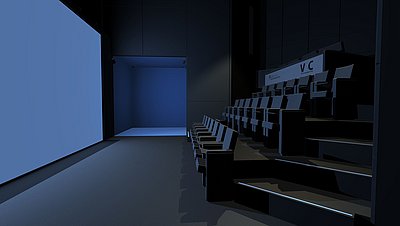Virtual Reality and Digital Games
Donnerstag, 14.3.2013, 13.30 Uhr Interface Culture Lecture Room, Kollegiumgasse 2, 3. OG
Gastvortrag von Dr. techn. Christoph Anthes im Rahmen der Interface Cultures Invited Lectures Series.
In 2012 the Leibniz Supercomputing Centre (LRZ) of the Bavarian Academy of Science and Humanities constructed a brand new centre for Virtual Reality and Visualisation (V2C) with the goal to support its users from the domains of life science, astrophysics, industrial design, architecture and even archaeology. These scientific user groups apply a combination of visualisation algorithms and VR technology for displaying and interacting with their data to gain deeper insight and to increase the understanding of their scientific datasets.
Yet, Virtual Reality (VR) can not only be used for these scientific applications, but instead has been offering fantastic possibilities for many players of digital games. VR and digital games are two areas which are closely related but have not fully managed to find a common ground. VR technology has often profited from gaming hardware, where the integration of VR technology into commercial games failed in most cases. On the software side both areas share the same algorithms, while the tools for application development are very different in both domains. The commonality in algorithms becomes especially apparent in networked virtual environments and multiplayer games. VR and games often have the common goal immersing the user and follow different approaches to achieve this effect.
This talk will introduce the LRZ with its virtual reality and visualisation facilities. A common history of digital games and virtual reality will be given to provide an overview on the interconnection between games, virtual environments and virtual reality hardware.
Christoph Anthes
received his PhD from the Johannes Kepler University, Linz in 2009.
He is leading the team for Virtual Reality and Visualisation at the Leibniz Supercomputing Centre in Garching and teaches Virtual Reality at the Ludwig Maximilians University, Munich.
His interests lie in the field of networked virtual reality and digital games.
www.v2c.lrz.de

